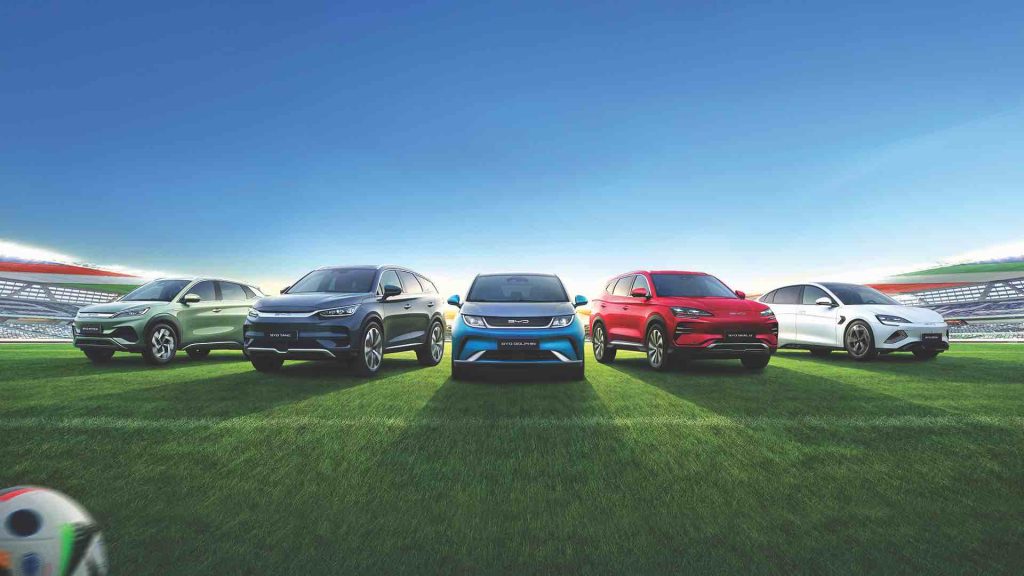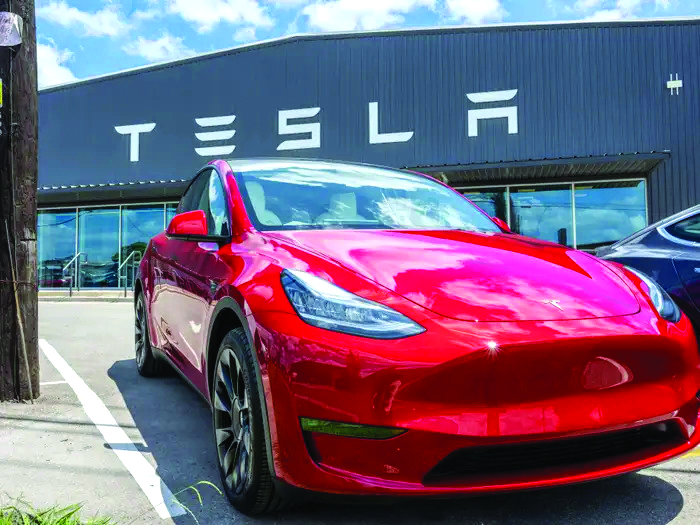Near-term global statistics on Electric Vehicle (EV) sales have prompted manufacturers and analysts to contend that the segment’s growth may not be a straight line after all.
Words Jennifer Paldano Goonewardane.

BYD, China’s largest EV manufacturer.
Let’s admit it. Electric vehicles (EVs) were like a chic new trend in the automobile industry, a classy option over traditional internal combustion engines and a responsible choice for a socially conscious generation. With Elon Musk’s Tesla leading the way with much noise and ballyhoo towards driving a solar-electric economy, conventional vehicle manufacturers who thrived in ICE vehicles had to join the race. As always, it only took a little while for Chinese companies to leverage the future market for EVs.
However, when electric vehicles looked to storm the highways, replacing the traditional internal combustion engines, the momentum seemed to be slowing down, at least in the near term, prompting some manufacturers to shift to a ‘build on demand’ approach. Automakers are facing the conundrum of a slow rise in the market for EVs, a slowdown in the pace of demand, and a departure from the ooh-ha that surrounded their emergence and projected growth. Right now, there is an oversupply of EVs compared to the demand. Decreasing demand and increasing competition in the EV market are impacting the industry right now.
Some analysts disprove the doom-gloom verdict for EVs, citing the slowdown to temporary glitches and short-term setbacks. At the same time, issues associated with chargers, lack of charging stations, and battery resiliency need to level out. Statista has projected EV market growth, and the revenue is estimated to reach USD 623.3 billion worldwide in 2024, accompanied by an annual growth rate of 9.82 percent. Supporting claims of a big future for EVs, Bloomberg New Energy Finance has said that EV sales in North America were up by 47 percent in 2023 while projecting a 32 percent hike in 2024. For the first time, EV sales in the US hit the one million mark in 2023, reinforcing the narrative of the optimists. Despite the growth forecasts, top EV manufacturers are adopting a new approach stemming from a recent decline in sales in the 2024 first quarter. The big question is, why are EV sales dropping?
The slowdown began in 2023. But the news of China’s largest EV manufacturer, BYD, bequeathing the title of the world’s biggest EV seller to Tesla in the first quarter of 2024 was only the tip of the iceberg. It demonstrated the general deceleration in the market for EVs. BYD sold 526,409 units in the last quarter of 2023 but could sell only 300,114 in the first quarter of 2024, reporting a 43 percent decrease in sales as opposed to the same period in 2023. Market watchers see BYD’s short-lived dominance as an outcome of its domestic price cuts. While Tesla overtook BYD in sales in the first quarter of 2024, its delivery of 386,810 vehicles and production of 433,371 cars were down 8.5 percent and 1.7 percent YOY, with a sales drop of more than 20 percent compared with the previous quarter. Tesla has slashed prices in major markets like the US and Europe, the Middle East and Africa, Germany, and China. In the United States, EV sales jumped by 2.6 percent in the first quarter of 2024 compared to last year but reported a 7.3 percent decline compared to the final quarter of 2023.
Analysts have spoken about the decline in EV sales. China has dominated the EV market, supposedly claiming nearly two-thirds of the global EV sales, followed by Europe and North America. As China’s largest EV manufacturer, BYD was selling more than 90 percent of its vehicles in China.
As a significant market, China has multiple home-grown EV manufacturers and brands like Tesla and other European models, creating intense competition for EVs on home soil. Hence, competition is another factor impacting EV sales; both BYD and Tesla are facing growing competition in China, not only from new entrants like Xiaomi but also from smaller manufacturers pursuing price cuts amid an economic slowdown at home. Therefore, apart from the competition in the EV market in China, analysts attribute the decline in BYD’s sales in the first quarter of 2024 to a slowdown in the Chinese economy. While the EV sales brake in the Chinese market has come to the forefront given its enormity, Europe is experiencing a similar phenomenon, led by fewer vehicle purchases, increasing demand for second-hands, and the impact of reversals of subsidy programs. For years, governments have been supporting the EV transition, following on their commitment to promote greener technologies, plugging incentives to manufacturers to convert to EVs, which brought down their prices. Thus, the subsidy cut impacted the EV industry in the EU markets. EV registrations have also reportedly declined in Germany, Norway, and Sweden. In addition to those setbacks, European manufacturers face competition from Chinese competitors.
Meanwhile, other brands such as GM, Ford, Renault, and LG are adjusting to the slowing growth in the global EV market in 2024. Tesla has been slashing prices as Musk warns of further slumps. The market volatility impacted Tesla’s shares, tumbling from 62 percent at the beginning of 2023 to 51 percent in the first quarter of 2024; Elon Musk plans to cut 10 percent of his workforce. Even Ford slashed the price of its Mustang Mach-E while reducing production of its electric pickup. Due to lackluster stock market conditions, Renault abandoned plans to list its EV business.
The news of China’s largest EV manufacturer, BYD, bequeathing the title of the world’s biggest EV seller to Tesla in the first quarter of 2024 was only the tip of the iceberg.

Tesla EV Car.

Elon Musk, CEO, Tesla Motors.
Moreover, intense competition has led to declining prices of prominent European EV brands, prompting companies to adopt prudent financial management measures, such as cutting capital spending and slashing jobs. Europe’s woes have caught up with EV start-ups like Britain’s arrival, which have delisted and suspended from trading as it grappled with high-interest rates and production costs while it struggled to infuse new capital. EV manufacturers like Lordstown Motors, Proterra, and Sweden’s Volta Trucks went bankrupt amid the financial woes. EV start-ups have been pitted against global economic volatility, barring them from accessing capital markets to buttress rising manufacturing costs while they see sales dropping.
So, China’s EV sales are slowing down. Competition among EV manufacturers in China is intensifying. That gives them all the more reason to spread their tentacles to overseas markets where they could demand a premium price. Chinese EV manufacturers are eying a market that has hitherto been the breeding ground for some of the world’s legendary brands. However, given the cost-effectiveness of Chinese-made EVs, home-grown legacy brands may see that their Chinese counterparts are offering affordable alternatives. However, analysts assert that manufacturers like BYD may want to avoid the ‘low-budget’ tag and may want to compete on par with other European automakers.
Meanwhile, Chinese EV manufacturers entering Europe would mean more headaches for European EV start-ups. While brand loyalty may see people wanting only the reputed home-grown brands in countries like Germany and France, one must acknowledge the Chinese EV incursion in Europe. It will likely challenge the region’s prominent brands, as the global economic headwinds will push consumers to choose affordable options. However, EV production will generally grow in 2024, as many top brands manufacture for the export market. Meanwhile, Houthi attacks in the Red Sea and a suspected arson attack on its German factory are reasons for the slowdown, according to Tesla. However, Musk critics tie the Tesla founder himself to the problem. Some point to Musk as the singular reason for Tesla’s setback, his divisiveness rubbing off on the wrong side of most people who spurn the famous brand. However, while the events in the Red Sea, factory disruptions, and Musk’s behavior may be the reasons for the brand’s suffering, that may be only minor. For many, the real reason for the EV market slowdown rests with growing competition in the EV market, with not only Chinese newcomers but also legacy automakers like Volkswagen, Peugeot, and Ford launching newer EV models, competing with Tesla, which enjoyed unfettered market dominance for EVs for several years. The market volatility has temporarily stopped Musk’s expansion plans into South Asia through India. However, Musk’s star still seems to favor him as Tesla stocks rebounded, a USD 14.5 billion increase, following his visit to China in late April, where he secured Beijing’s blessings to deploy his company’s self-driving technology. This windfall will surely make it easier for Musk to convince shareholders to fork out a USD 56 billion pay package that he has been asking for.
Information for this article was extracted from YouTube channel DW News video titled ‘What’s happening to electric vehicle sales’ produced for DW Business
‘Industry pain abounds as electric car demands hits slowdown’ by Nick Carey and Joseph White for Reuters on January 30, 2024
‘No, EV Sales Aren’t Slowing Down (But They Will)’ by Rob Day for Forbes, February 9, 2024

The stunning BYD SEAL a proud recipient of the coveted iF Design Award, and BYD ATTO 3 is equipped with the all-new BYD e-Platform 3.0 designed exclusively for pure electric vehicles.





